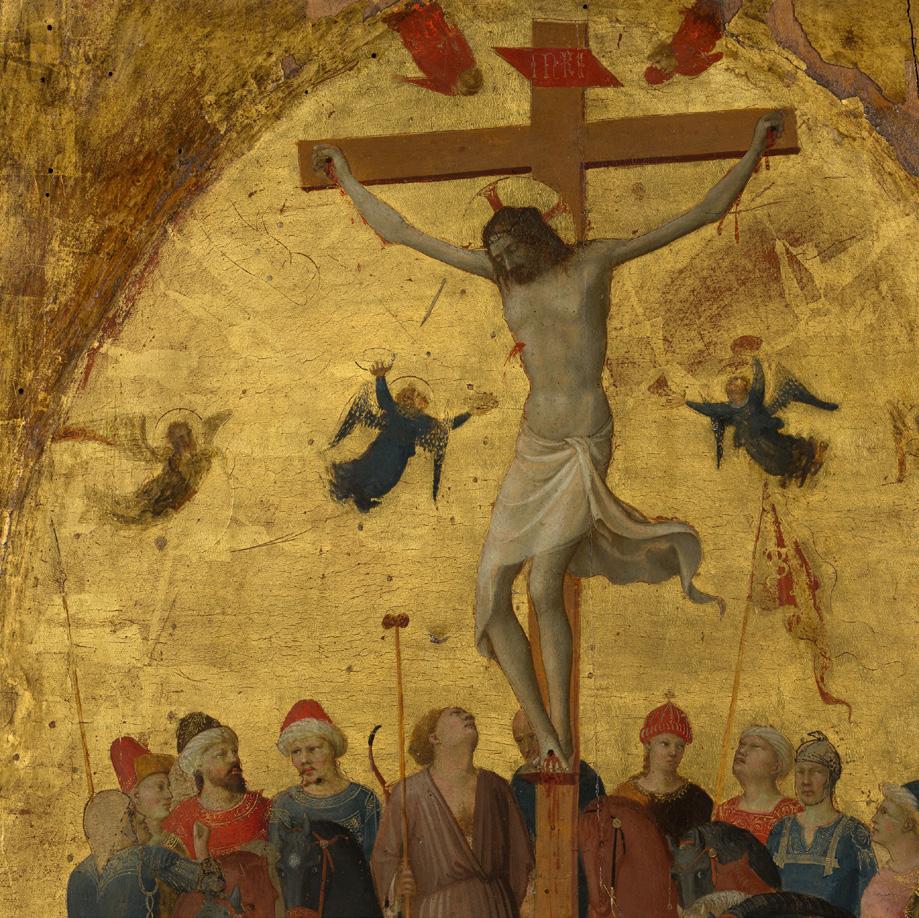
15 minute read
A letter from a Benedictine monk
faith of our fathers A letter from a Benedictine monk THE WEAPONS OF OBEDIENCE IV: JUSTICE
SAINT BENEDICT. ENGRAVING BY F.L. SCHMITNER (1703-1761). WELLCOME COLLECTION, LONDON.
Advertisement
Calx Mariae is pleased to continue the series of letters from a Benedictine monk. Each letter discusses one of the most important virtues and principles in the Rule of St Benedict – the rule on which the Western monastic tradition and Christian civilisation in Europe were founded.
In the Prologue of his Rule, St Benedict, the patron saint of Europe writes: “We have therefore to establish a school of the Lord’s service, in the institution of which we hope we are going to establish nothing harsh, nothing burdensome. But if, prompted by the desire to attain to equity, anything be set forth somewhat strictly for the correction of vice or the preservation of charity, do not therefore in fear and terror flee back from the way of salvation of which the beginning cannot but be a narrow entrance. For it is by progressing in the life of conversion and faith that, with heart enlarged and in ineffable sweetness of love, one runs in the way of God’s commandments, so that never deserting His discipleship but persevering until death in His doctrine within the monastery, we may partake by patience in the suffering of Christ and become worthy inheritors of His kingdom.”
After looking at humility, obedience, prudence, fortitude, and temperance in the Rule of St Benedict, in this edition we continue with the virtue of justice. May these reflections on one of the core virtues of monastic life help us to fulfil the duties of our state in life.
“Seek ye first the kingdom of God, and his justice, and all these things shall be added unto you.” (Mt 6:33) These words of Our Lord from the Sermon on the Mount summarise the last chapter of the Rule of St Benedict. In it our holy father tells us, “Whoever you are, therefore, who are hastening to the heavenly homeland, fulfil with the help of Christ this minimum Rule which we have written for beginners.” This, my brothers and sisters, is our great purpose in life: to hasten to our heavenly homeland. Indeed, our Lord tells us to “rejoice in this, that your names are written in heaven”. (Lk 10:20) At the moment of our baptism, our names were written on the guest list for the eternal wedding feast of the Lamb, and we RSVP for that unending banquet every moment we live in conformity with the will of God. It is for this reason that we take St Benedict as our guide and follow his Rule, that we may confirm that most desirable of reservations by living in a way pleasing to God. And yet St Benedict himself, in his great modesty, calls his Rule “little”; it is only a beginning, a “basic training”, so to speak, that allows us to start the path that leads to all holiness. It is for this reason that he gives as the title for this chapter, “On the fact that the full observance of justice is not established in this rule”.1 “Observe my Rule, by all means,” he wishes to tell us, “but do not think that by doing so you have reached the full measure of holiness”, or in other words, “of all justice”. By so speaking he keeps us humble, so that we do not get puffed up when we find ourselves living according to the Rule. But his manner of speaking also makes clear that justice is synonymous with holiness and, indeed, interchangeable with it. Holiness consists in being interiorly just, in possessing and being governed by the virtues of prudence, fortitude and temperance, as well as faith, hope and charity. We are holy, and just, to the degree that we have these virtues.
In reflecting on and writing to you about the cardinal virtues in my previous letters, it became abundantly clear to me that I possess them very insufficiently, and have a long road ahead of me in order to perfect them. If you also found yourself falling short of the perfection of the virtues, and like me, perceive your own faults and imperfections more than your virtues, be not dismayed! There is a great hope for us in the fifth step of humility, which, St Benedict tells us,

“is that the monk hide from his Abbot none of the evil thoughts that enter his heart or the sins committed in secret, but that he humbly confess them. The Scripture urges us to this when it says, ‘Reveal your way to the Lord and hope in Him’ (Ps 36:5), and again, ‘Confess to the
Lord, for He is good, for His mercy endures forever’ (Ps 105:1). And the Prophet likewise says, ‘My offense I have made known to You, and my iniquities I have not covered up. I said:
“I will declare against myself my iniquities to the Lord”; and “You forgave the wickedness of my heart”.’” (RB 7; Ps 31:5) Indeed, Scripture says that the “just man is the first to accuse himself” (Prov 18:17), teaching us that it is characteristic of justice, and therefore holiness, to confess our shortcomings so as to receive God’s mercy. It is, moreover, through faith in Jesus Christ that we obtain mercy, for “if thou confess with thy mouth the Lord Jesus, and believe in thy heart that God hath raised him up from the dead, thou shalt be saved. For, with the heart, we believe unto justice; but, with the mouth, confession is made unto salvation. For the scripture saith: Whosoever believeth in him, shall not be confounded…and whosoever shall call upon the name of the Lord, shall be saved”. (Rom 10:9-13; Isaiah 28:16; Joel 2:32) Accordingly, St Ambrose says that the foundation of justice is faith.2 And it is in this faith – that God alone is able to set things right in our soul through His grace – that we are able to grow in interior justice. It is characteristic of this interior justice, finally, to radiate outwards in our relationship with others so that we give to each person what is his or her due, that we treat them as is appropriate, and thus our relationships with others are stamped with equity, honesty and impartiality since they are formed by the virtue of justice.
For St Benedict, it is in God first and foremost that we see the virtue of justice. The first principle to be observed is that “with God there is no respect of persons”. (RB 2; Romans 2:11) By this is meant that God does not “play favorites”. He


CHRIST THE JUDGE (1447). FRA ANGELICO. CAPPELLA DI SAN BRIZIO, ORVIETO.
does not love one person more than another on account of exterior, carnal or visible things (such as race, lineage, or wealth, or physical qualities such as beauty or strength, or intellectual abilities), as human beings tend to do. On the contrary, He has boundless love for each and every one of us, and desires our happiness and eternal salvation more than we ourselves desire it. To this end, He provides each person with the necessities of life as well as the necessary means of salvation. This does not mean, however, that God’s love is “equal” in the sense that He does not love and reward some people more than others; but rather that He has a different way of determining who is more meritorious and, therefore, more loveable. Now God loves Christ above all; thus, He loves us more to the extent that we are Christlike, to the extent that He sees His dearly beloved Son in us, that He sees the virtues of His Son alive and operative in us, His adopted sons and daughters. Consequently, St Benedict says that “only for one reason are we preferred in His sight: if we be found better than others in good works, humility and obedience”. (cf. RB 2)
The Abbot, therefore, and each monk in his own way, is called to imitate the love and justice of God. He is to manifest an equal love towards all in the sense that he energetically seeks and spends himself for their salvation; but he can, and indeed, should, love and appropriately reward some more than others if he finds that they excel in the Christlike virtues of good works, humility and obedience. (RB 2) Furthermore, the Abbot is to ensure that distribution of common necessities is made according to need. St Benedict’s explanation of this principle in RB 34 is so rich for our consideration of justice that it seems only fitting to quote the entire chapter:
“Let us follow the Scripture, ‘Distribution was made to each according as anyone had need’ (Acts 4:35). By this we do not mean that there should be respecting of persons (which God forbid), but consideration for infirmities. He who needs less should thank God and not be discontented; but he who needs more should be humbled by the thought of his infirmity rather than feeling important on account of the kind-
ness shown him. Thus all the members will be at peace. Above all, let not the evil of murmuring appear for any reason whatsoever in the least word or sign. If anyone is caught at it, let him be placed under very severe discipline.”
The first thing to be observed is that St Benedict models his monastic community on the ancient, primary community of the Church in Jerusalem. St Ambrose, in the same homily quoted above, makes the remarkable statement that “the Church is in a certain sense a pattern of justice, the common law for all: she prays in common, works in common, and is tried in common.”3 Now the monastery is the Church in miniature, as expressed by the Latin word ecclesiola. What St Ambrose says about the Church is equally applicable to the monastery: it too is a pattern of justice because all the members are so united in Christ that they pray in common, work in common, and are tried in common, for “we being many, are one body in Christ, and every one members one of another” (Rom 12:5) and “God hath tempered the body together…that there might be no schism in the body; but that the members might be mutually careful one for another. And if one member suffer anything, all the members suffer with it; or if one member glory, all the members rejoice with it”. (1 Cor 12) We must have these thoughts in mind in reading chapter 34 of the Rule: that in the monastery, as in the Church, we are all members of the same body, and we should allow our personal needs to be met by our fellow members while we rejoice that the needs of our brothers are met, even when those needs are different, or more demanding, than our own. He who needs more should be humbled by the extra attention that is rendered to him, while he who needs less should be grateful that he is stronger and can do with less. This, according to St Benedict is justice in the monastery: not only that the Abbot provides for the different needs of his monks, but also that the monks rejoice in having the needs of their brothers met. And it is this kind of justice which engenders genuine and lasting peace, not only in the monastery, but as in every family as well.
Implicit in all of this is the fundamental truth that we are different, not identical! Justice is true when it gives to each according to the truth of who he or she is, of what his or her needs truly are. This is far from the false concept of justice and equality that reigns in our liberal, materialistic society, which seeks to eliminate all differences – even the most basic and undeniable differences of bodily sex and gender – so as to establish an “absolute” equality and an “absolute” justice. But this rejection of reality and truth ultimately results not in justice, but in countless injustices, as an ancient maxim of Roman law states: “the height of justice is the height of injustice.”4
What, indeed, could motivate such a drastic elimination of differences, and thereby establish such reckless injustice? It appears that only one foe could inspire such a diabolical scheme – that inseparable friend of the devil himself: envy. It is envy that hates differences and thus it is the perennial enemy of justice. But let us be clear: what envy truly hates is the happiness of others, and therefore it seeks to eliminate any difference that would increase the happiness of another. On the other hand, whenever such differences lead to the misery of another, envy rejoices in these differences and seeks to confirm them. That is justice according to envy: that others be miserable, and I alone be content! Envy ruins communities, destroys marriages, separates friends, inspires hatred between siblings, terminates thriving careers and suffocates the prosperity of others.
Now most people do not experience this awful vice in such an extreme manner, but we all have to deal with, and fight against it, to some degree. Usually it manifests itself in the tone of one’s voice, in facial expressions, in uncharitable comments, in cold silences, and very often, in murmuring. What is murmuring? It is quietly sowing discord while trying to appear innocent and harmless. It is expressing discontent so as to make that discontent multiply in the hearts of others. It is complaining about one’s lot to others so as win their sympathy. When fueled by envy, murmuring is playing the victim. But murmuring can also be fueled by avarice – the insatiable desire to own more, to have more. Now there are many similarities between avarice and envy, but in the end, they are quite different. Avarice seeks to amass wealth and power. It may trample on others in order to get such things, but



THE CRUCIFIXION (C.1420–23). FRA ANGELICO. THE METROPOLITAN MUSEUM OF ART, NEW YORK.
that is unintentional. It does not aim at causing harm to others per se. Envy, on the other hand, does not rest until another’s happiness is diminished, if not destroyed. Now perhaps we can understand why St Benedict hates “the evil of murmuring” so much, for it manifests avarice and envy!
In order, therefore, to have justice in our relationships with others, we must rid our hearts of all envy and avarice, as St Benedict tells us in chapter 4 on the instruments of good works. And we must conscientiously try to live according to the Golden Rule, “Never do to another what you do not want done to yourself” (Mt 7:12; Tobit 4:16), which was considerably important for St Benedict, for he not only includes it in the instruments of good works, but repeats it at least two more times in the Rule.5 According to the same list of good works, however, and the Gospel of which it is a summary, there is still more to the virtue of justice. “For I tell you, that unless your justice abound more that of the scribes and Pharisees, you shall not enter into the kingdom of heaven.” (Mt 5:20) For Christ through St Benedict tells us “not to return evil for evil; to do no wrong to anyone, and to bear patiently wrongs done to oneself; to love one’s enemies; not to curse those who curse us, but rather to bless them; and finally, to bear persecution for justice’s sake”. The fourth step of humility expands upon this in speaking about “those faithful ones who by their patience fulfil the Lord’s command in adversities and injuries: when struck on one cheek, they offer the other; when deprived of their tunic, they surrender also their cloak; when forced to go a mile, they go two (Mt 5:39-41); with the Apostle Paul they bear with false brethren and bless those who curse them (2 Cor 11:26; 1 Cor 4:12)”. What all this means is that the perfection of justice is to be found in the imitation of Christ, of Him who bore injustice for our sake, and lavished mercy and forgiveness upon those who persecuted and killed Him. This was the first of His seven words to come forth from the Cross: “Father, forgive them, for they know not what they do.” (Lk 23:34) It is on the Cross that “the Lord hath revealed his justice in the sight of the Gentiles”. (Ps 97:2) In concluding this meditation on justice in the Rule of St Benedict, I would like to leave you with chapter 72 on good zeal, which I think is the most beautiful and inspiring exhortation in the Rule, and an eminent summary of the virtue of justice:
“Just as there is an evil zeal of bitterness which separates from God and leads to hell, so there is a good zeal which separates from vices and leads to God and to life everlasting. This zeal, therefore, the monks should practice with the most fervent love. Thus they should anticipate one another in honour; most patiently endure one another’s infirmities, whether of body or of character; vie in paying obedience one to another – no one following what he considers useful for himself, but rather what benefits another; tender the charity of brotherhood chastely; fear God in love; love their Abbot with a sincere and humble charity; prefer nothing whatever to Christ. And may He bring us all together to life everlasting.”
Endnotes:
1. De hoc quod non omnis iustitiae observatio in hac sit regula constituta. 2. Homily at Matins for the III Sunday of August; Ex libro Officiorum, cap. 28, n. 136. 3. Ecclesia quaedam forma justitiae est, commune jus omnium: in commune orat, in commune operatur, in commune tentatur. 4. Summum ius summa iniuria. 5. Et quod sibi quis fieri non vult, alio ne faciat. See also RB 61:14 and 70:7.










